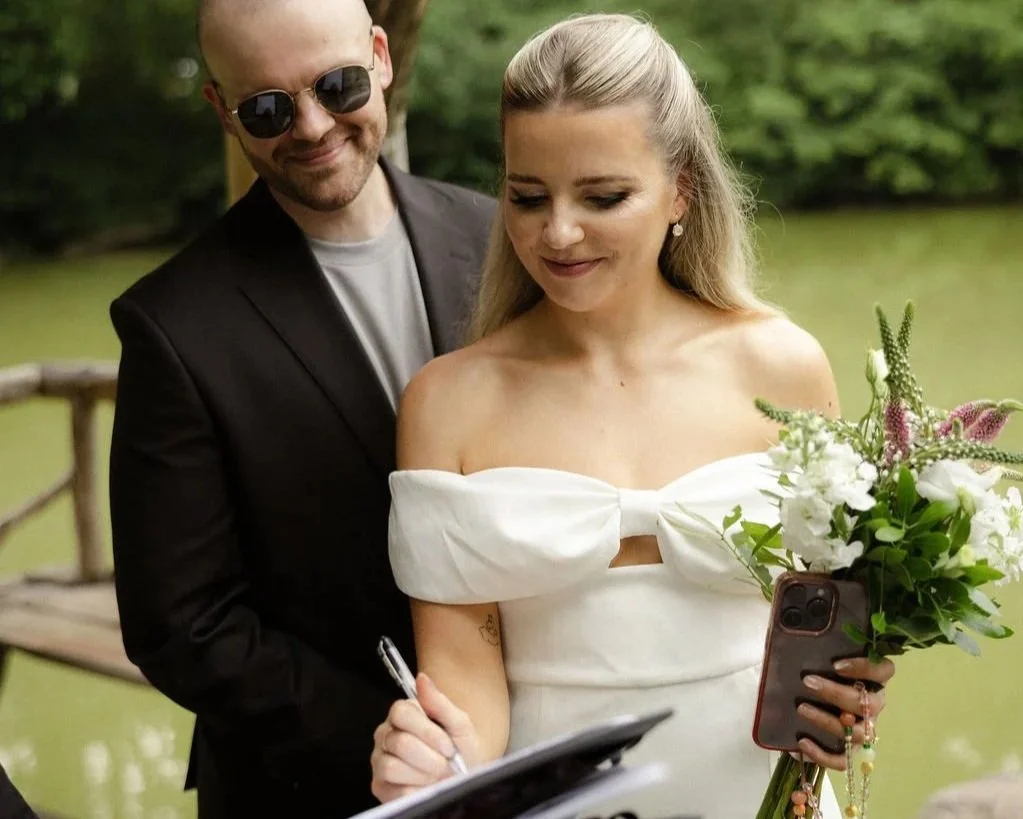What Day-Of Coordination Looks Like at Cakewalk: White-Glove Support for Small NYC Weddings
When people hear “day-of coordinator,” they usually picture someone managing a large wedding: wrangling vendors, adjusting a ballroom timeline, cueing a DJ, or fixing a boutonniere before lining up a wedding party.
Cakewalk is not that kind of wedding.
Our weddings are tiny, intentional, and wildly different from anything that needs a 20-page production schedule. But that doesn’t mean they run themselves — in fact, the smaller the wedding, the more every detail matters.
That’s why our version of Day-Of Coordination is something completely different:
white-glove, deeply personal, hands-on support from the same person who legally marries you.
It’s elegant.
It’s human.
And it’s built for the reality of New York City.
What Cakewalk Calls “Coordination” Is Closer to Personal Concierge Service
In a traditional wedding, the coordinator is one vendor among many.
In a Cakewalk wedding, the officiant is your coordinator — the person running the ceremony, holding the paperwork, communicating with your guests, and keeping the flow smooth.
This model works beautifully because your officiant is already the emotional anchor of the day. They’ve read your questionnaire, they know your story, and they know what this moment actually means to you.
So instead of hiring a coordinator you’ve never met, you have one person you trust handling:
Ceremony timing
Guest management
Location logistics
Permit handling
Travel or transit delays
Weather adjustments
Communication with your photographer
Marriage license signing
Ring and vow management
Queueing private vow moments
Cueing your walk-in and recessional
Making sure your ceremony spot is comfortable, presentable, and photogenic
It’s seamless, intuitive, and warm.
This is why Cakewalk ceremonies feel effortless — because the person guiding them is doing far more than speaking for 10 minutes.
How Cakewalk’s Day-Of Coordination Works (Step-by-Step)
Here’s what coordination looks like at a typical Cakewalk wedding:
1. Before the wedding day
Your officiant:
Reviews your questionnaire
Prepares your ceremony
Coordinates with your photographer
Confirms the location, timing, and route
Holds your permit (if needed)
Reviews travel or hotel details
Checks in about weather and backup location options
Confirms vow plans and ring responsibilities
Gets an understanding of family dynamics
You don’t have to manage moving parts — we do that for you.
2. On the wedding day
Your officiant will be the first person on-site, and this matters.
They are the one who:
Greets your guests
Directs anyone arriving early
Calms nerves
Communicates with the photographer about angles, light, and timing
Makes sure the ceremony spot is clear and ready
Holds the rings (or assigns someone intentionally)
Manages phones, bags, coats, and onlookers
Handles noise, crowds, or unexpected activity with grace
Guides you into the ceremony moment
Signs and verifies your marriage license
This is the “white glove” part.
Every detail that could distract you is quietly handled.
3. After you’re married
Your officiant transitions into your post-ceremony concierge:
Guides your family into photos
Helps you sign your license
Finalizes witness signatures
Confirms where the license will be mailed or filed
Helps direct the group if you’re walking to a second location
Communicates with your photographer to ensure top-priority shots happen before time runs out
No couple should ever stand on the Promenade, the High Line, or Bethesda Terrace wondering, “Now what?”
Cakewalk officiants make sure you never do.
Why This Style Is Perfect for Elopements and Tiny Weddings
A tiny wedding may look simple from the outside, but it actually involves more nuance, not less.
When the group is small, everything is intimate. Every moment matters. Every shift in energy is noticeable.
You need someone who can read the room — even if the “room” is a public space in New York City.
Our officiants know how to:
Steer a moment without making it feel directed
Protect the intimacy of the ceremony
Gently handle family dynamics
Create privacy in a public location
Adjust on the fly without you feeling the change
Manage crowd flow and curious onlookers
Keep a light, elegant pace
Protect the emotional moment as much as the logistical one
This is not something a random officiant or an external coordinator can do.
This is the signature Cakewalk style — calm, grounded, quietly in control, and deeply caring.
How Cakewalk Planning + Day-Of Coordination Work Together
Unlike most coordinators who meet you a month before your wedding, we’ve been with you from the beginning.
Here’s the difference:
Traditional Planning
months of emails
vendor sourcing
full venue logistics
multi-hour timelines
huge guest lists
competing personalities
Cakewalk Planning
location scouting
permit management
photographer booking
officiant matching
marriage license guidance
run-of-show creation
custom ceremony writing
Every piece is handled, so the day-of is simply the execution of a plan that’s already been curated around you.
Why Cakewalk Doesn’t Allow Outside Coordinators
Because it breaks the flow.
Our officiants and photographers work as a team — they communicate nonverbally, adjust together, and understand the rhythm of a one-hour experience. Outside coordinators often:
slow the pace
crowd the space
bring wedding-industry theatrics into an elopement
contradict the officiant’s and photographer’s flow
turn a simple experience into something over-managed
We keep the team small, nimble, and tightly coordinated for a reason:
simplicity creates magic.
If You’re Searching for “Day-Of Coordinator NYC”… You Might Actually Want Cakewalk
Most couples who search for day-of coordination are overwhelmed.
They want someone to take over so they can enjoy their wedding without micromanaging it.
If your wedding is small, intimate, or outdoors, you don’t need a full coordinator.
You need someone who understands:
the rhythm of elopements
the flow of public spaces
how to protect the ceremony moment
how to guide families
how to handle the legal part of getting married
how to make it look effortless
Cakewalk combines all of that into one discreet, elegant package.
It’s not day-of coordination.
It’s care — built into every moment.




